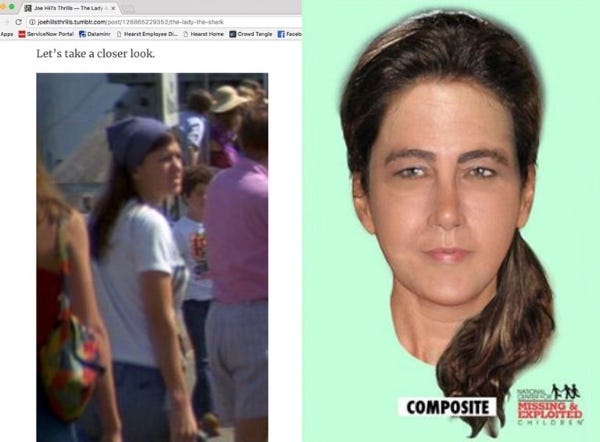Thanks for paying another visit to my stretch of the woods. Let's go for a ride -- how 'bout it?
(and thanks to Padre Tom Monteleone for the snap)
In 2015, over on my (now disused) tumblr page, I posted a tin-foil hat theory about JAWS, the greatest fish story ever put to screen. The movie was shot in the summer of 1974 on Martha's Vineyard. That same summer, the dismembered corpse of a young woman was discovered in the dunes outside of Provincetown on Cape Cod, not far away. Forty years later and we still don't know who she was, let alone who killed her. I posited an admittedly far-fetched possibility: that she can be seen fleetingly in a crowd scene in Spielberg's masterpiece, captured in the last days of her life.
When the piece originally appeared, it churned up some online excitement, and for a while a reporter from Entertainment Weekly was even working with the archivist at Universal Pictures to track down whatever paperwork they might have on the extras (she drew a blank). My JAWS idea had its moment and then submerged for three years... only to resurface with a gnashing of teeth a week or so back, when it was mentioned in passing on the Inside Jaws podcast. I guess a lot of people in media listen to that podcast, cos suddenly it was flying around the web faster than Nyan Cat. I knew I had hit the big time when they started covering it in the British tabloids.
As notions go, I'm aware this one is only about three paces from the shooter on the grassy knoll. My subconscious is particularly good at manufacturing ghost stories. It's probably the thing I'm best at. And in my heart of hearts, that's mostly all I think this is... a creepy-weird little ghost story, and nothing more.
And yet.
And yet.
For the curious and the latecomers, here's one of the better pieces to appear in the last few days on the subject of the lady and the shark and the hot, bloody summer of 1974.
Malcom Gladwell's 10,000 hour rule -- the idea that you need 10,000 hours of practice to attain mastery in any given field -- has been around for a while now. There's good reason to feel the rule has been oversold, but I think there's a degree of truth to it, and I'd like to add my own shading. 10,000 hours of practice might give you a reasonable level of mastery over the guitar, but 10,000 hours of practice in 12 years will make you a lot better than 10,000 hours in 24 years, or 40. How could it be otherwise? Skills are muscles and the more they're used, the more they're built up.
I told my wife I wanted a body like Chris Pratt, and she said it was important to remember that much of Chris Pratt's job is having a body like Chris Pratt. You see what I'm saying. Or, as the case might be, what she's saying.
In our corrupted, confusing decade it's easy to feel overwhelmed by information overload and outrage fatigue. In this new era of flagrant assholery, it's more important than ever to preserve your sanity and sense of perspective. To that end, may I recommend McSweeney's Small Blows Against Encroaching Totalitarianism, in which some twenty-two of our best writers talk about what you can do to push back against the cruel, the shameless, the conspiracy nuts, the kleptocrats, the bots and the bullies. In there among fine works by the brilliant likes of Karen Joy Fowler, Rick Moody, and Bill McKibben, you'll find a coolly observed, steely-eyed essay about life in One Nation Under Glock, composed by my brother, the novelist Owen King. Do yourself a favor and add this one to your library.
Here are two pieces, which, taken together, seem to me a necessary corrective to the ideas promoted by the self-appointed art and culture cops of social media: Kwame Anthony Appiah's "Go Ahead, Speak For Yourself," and Grace Schulman's "The Nation Betrays a Poet -- And Itself."
An artist attempts to explore the lives and ideas of people different from herself, and bring an audience along for the ride, in an exercise of compassion and the imagination. Ideological people hate that, of course; they despise pretend and work tirelessly to set rules about what is and isn't permissible to imagine. And when a self-appointed gatekeeper attacks online, he almost always represents his own views as somehow global. He will suggest his unique experience gives him license to express an opinion for a much larger demographic. If he can get some others to mob up with him, it may even appear true. But the deeper truth is that we all only speak for a demographic of one. Ironically, art remains our very best tool for escaping that lonely demographic and trying to imagine our way into someone else's identity for a few moments. Art opens you up, while the loudest voices in the online world will always try to shut you down.
To put it another way, the culture cops have convinced me of the limits of their imaginations; they haven't established the limits on yours, and you don't have to let them.
Essential
New feature: here and in the forthcoming issues of Escape Hatch, I'm going to try and highlight one novel, short story, comic, movie, show, poem, or polemic that is too fucking good to miss. We are dangerously close to drowning in our own entertainment. I heard there will be 500 original TV shows next year, and I assume that's just on Netflix (I'm only slightly kidding). I am here to help you find the signal in the noise: here's my take on what shouldn't be missed.
If there's one antagonist who has really leapt off the screen in the Marvel films, it's got to be Tom Hiddleston's Loki: scheming, charismatic, seductive, and selfish. It's amazing stuff... and (almost inevitably) it also represents the barest sliver of what he's capable of as an actor. When he's only got maybe twelve minutes of screen time a picture, how could that not be the case?
The Night Manager gives him an opportunity to do so, so much more and to do it brilliantly... to long and lose, to suffer and struggle with moral conundrums, to charm and chafe, to hate and plot and inspire, to be a heroic Iago and a crooked Hamlet all in the same story. It helps to have Hugh Laurie as a dramatic foil. Laurie's got the greatest voice this side of Orson Welles, and much the same air of louche erudition. With respect to Dr. House, arms dealer and playboy Richard Roper is the defining role of his career (at least for now). Olivia Coleman's crafty, decent, unshakable Angela Burr is the wily strategist who puts Hiddleston and Laurie on a collision course, and in the process delivers another of her effortlessly masterful performances. And then there's sensitive, secretive Elizabeth Debicki, who is more entrancing and emotionally engaging than any dozen Bond girls put together.
The suspense is unrelenting, building and building until you can't stand it, and then building some more to a payoff as elegant as a magician turning a scarf into a dove. Some have said The Night Manager is a Le Carré story reconfigured along the lines of a 007 flick, but I almost feel like that's got it backwards. It's more like Team Le Carré showing what a Bond film could be if they ever bothered to be about anything, if the danger was real and the story showed us something true about our own world. If we were not just entertained but also learned and wrestled with some of the world's pain for a while.
Cancel your plans for the weekend and put this one on.
That's all I got this time. I hope the summer hasn't left you too parboiled or fatigued or disgusted. Keep reading. There's some great books out there and you don't want to miss them. Human beings are making a mess of the world, but we also created Coca-Cola, so the species isn't all bad. Hang in there and I'll come crashing back into your in-box soon.







